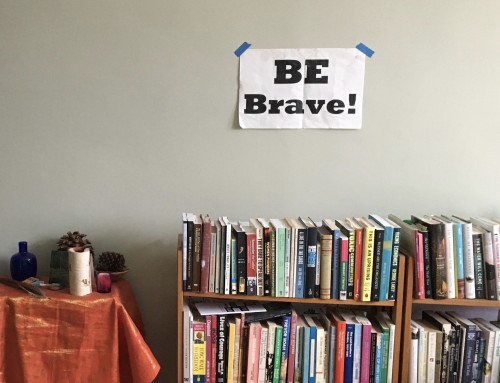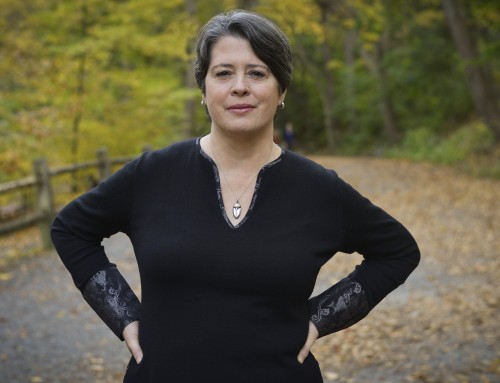I’ve been thinking about a comment from two posts ago about trusting the discernment of our children. It seems to bring together two huge and difficult questions: How do we know if someone else is truly listening to God’s guidance? And how do we prepare our children to be adults?
On the first question, it’s hard enough to know if we are really being faithful ourselves; it is so easy to frame our own desires in the language of leading. Early Friends were suspicious of their own desires—to the extreme perhaps, living as they were at a time when anything “natural” seemed suspect—but we’ve gone the other way. We consider our own desires something to pay attention to when discerning God’s leading, which in general, I think is right. However, it is awfully easy to confuse our superficial, insecure, socially conditioned desires with the deep desires of our “true selves,” to use the language of many religious writers.
In Quaker tradition, the community helps to challenge our inclination to fool ourselves. Today we have clearness committees, but in earlier eras I have the sense that Friends challenged each other more regularly, not just when they were asked to serve on a committee. In contrast, today I have the sense that we accept that another person has a leading without much question, unless they happen to run up against our own preconceptions about what God wants. For example, if I announced in meeting that I thought God was leading me to get a BMW, Friends might be suspicious. But if I announced that I felt led to get a Prius, I suspect few would question it, even though it could be a leading or just an attempt to look cool and environmentally hip without really changing my driving habits. (I give this example not to criticize anyone who has a Prius but because I’ve been toying with getting one myself, and I’m not sure where the impulse is coming from.)
Of course, in many ways we are the best ones to question our own motives, if we are willing to challenge ourselves, that is. I know best how I usually feel when I am led, and how I can fool myself when I am not. But the question of how we assess each other’s discernment becomes important when an individual asks the community for support. For example, when Quakers want to be married under the care of a meeting or when they want funds to support a ministry they are carrying out, the community has a role in checking their discernment. We ask questions, listen deeply, and see if what they sense matches up with what we sense.
Perhaps being a parent is like being the member of an oversight or clearness committee, but I think that might be too simple. Parents have to recognize that their children are growing and changing over time, so the guidance and limits they need at four are quite different from what they need at fourteen. And part of our job is to encourage them to listen inwardly for guidance, while we approach clearness committees with adults more or less assuming (sometimes optimistically) that the person we are meeting with already knows what to listen for. Sarah’s question has me thinking about how to develop my children’s discernment more deliberately and what role I play in challenging it.
I just looked up the comment that sparked this train of thought and realized that she never used the word discernment. Here is her wording of the question:
The Quaker perspective is that everyone has some piece of the truth. How do we honor that in our children – truly honor it?
I remember a story I heard when I was living at Pendle Hill many years ago. Fran Taber—who grew up in a rural Quaker community that was more insular and conservative than the world my children experience—shared the memory of being given a piece of candy when she was a girl. She asked her mother if she could have it, and if my memory is correct, her mother said, “What does thou think, Fran?” Being given this important choice herself, Fran took it seriously and decided to save the candy until after dinner.
When I first heard this story, I thought it reflected the idea Sarah was getting at, that everyone has access to truth, including children, and that we need to honor and encourage that in each other. However, when I told this story to the children in our meeting’s First Day School (Quakerspeak for Sunday school), I remember the regular teacher looking at me like I was crazy. I had a sense that the story didn’t make sense in our circumstances where a piece of candy is not a rare treat, but something to be taken for granted. At the time, my own children were quite young, but I felt a sudden concern. How do I give my children the freedom to learn to make decisions for themselves in a culture where McDonalds, Radio Disney, and a myriad of other corporations have marketers paid specifically to shape my children’s tastes? In this culture, especially now with an eight-year-old and an eleven-year-old, I find myself trying to shelter my children more than empowering them. When my daughter says she wants an iPod nano, I suspect it is the advertising and peer pressure at work, rather than her inner truth.
But I’m still left with the question of how to prepare my children for adulthood, when they will need to make their own decisions, not only about consumer choices, but about many other things as well. One of the women I interviewed for my book talked about the fact that when she was raising her children she always kept in mind that she was ultimately preparing them to leave home and live their own lives. It is easy to forget this in the midst of packing lunches and signing permission slips, but there is a truth there that I am becoming more aware of as we approach adolescence. I’d love to hear stories from others about how they are helping prepare their children to live independently, and especially how they help children pay attention to God’s guidance. Please post any wisdom you have to share!




Beautiful article, Eileen. Thanks for thinking thru these issues with us.
1 question I would have is, why you think that your daughter was listening more to advertising, rather than her inner truth.
1 tack I’ve taken when we have discussions is to present each other’s viewpoint, e.g. me begging for the ipod, and my daughter raising questions.
I also look for teachable moments. After my daughter bought a sweater with a Abercrombie gift card from xmas, we got into a discussion of the lives of the poor in Africa. We finally got around to the pros and cons of spending $29 for a sweater, and how that $$ could help someone live in Africa. It was very direct comparison, and hit her in a different way how her spending effects the world.
These posts help me think!
Wonderful post – I wish I had more wisdom to share. We talk a lot about values in my house and my daughter has definitely internalized most of them. I find the ones that are hardest, though, are the ones that her dad and I don’t necessarily agree about. Rather, he doesn’t really disagree – they just were not part of his upbringing and she knows it.
Eileen: Agreed, great questions and reflections.
As to the question of marketing, our sons’ school is having a presentation by the founder of Common Sense Media, so I’m hoping this will provide even more insight into developmentally appopriate exposure to media and how to resist the marketers’ quest for dominance (aka “market share”): http://www.commonsensemedia.org“ REL=”nofollow”>http://www.commonsensemedia.org. Though they say they believe in “media sanity, not censorship.” I’m not sure I agree!
Just having the analysis in a spiritual framework can help parents explain this stuff to children, I think. For example, Brian McLaren’s “Everything Must Change” has some good stuff about the “covert curriculum” of “theocapitalism.”
As for teaching discernment, I think Robin & I look for chances to share a little about our own discernment at times, or talk about people at meeting who may be listening for what God is calling them to do. Role modeling is more powerful than words here, I suspect.
Oh, and one other link: http://theearthquaker.blogspot.com/2007/12/prius-piety.html“ REL=”nofollow”>Prius Piety by Carl Magruder. Thought-provoking. I was there at the business session where he talked about Prii (plural of Prius).
Hi Eileen,
I’m writing an article for spanish speaking youth leaders on discernment related to the influence of media. Googling brought me to your post and i ejnoyed it, especially the story about the candy and the realization that you find yourself expending more energy trying to shelter them than empowering them. thanks for writing.
annette
Thanks for visiting my blog, Annette. I’m sorry I couldn’t read yours!